Prakash Bhat
Predicting Through Generation: Why Generation Is Better for Prediction
Feb 25, 2025
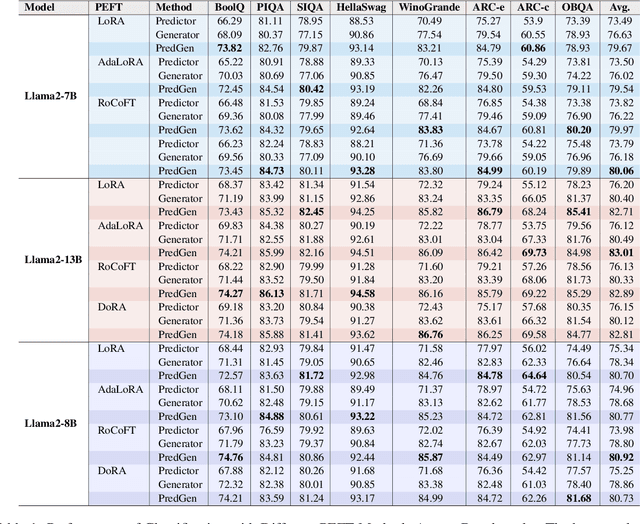
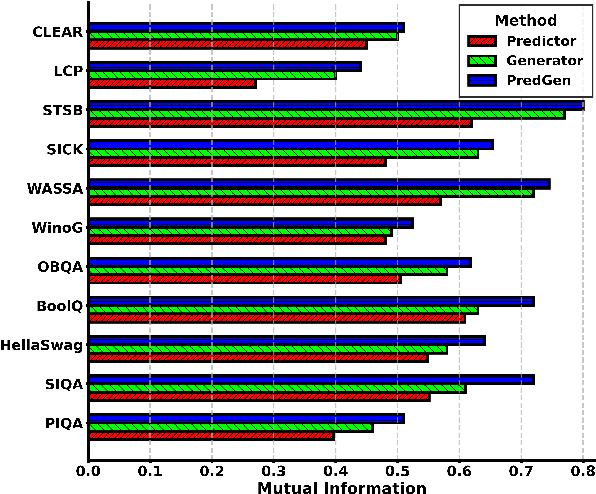
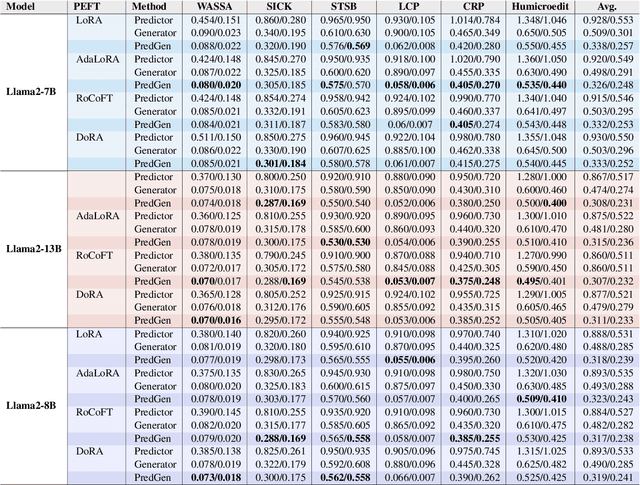
Abstract:This paper argues that generating output tokens is more effective than using pooled representations for prediction tasks because token-level generation retains more mutual information. Since LLMs are trained on massive text corpora using next-token prediction, generation aligns naturally with their learned behavior. Using the Data Processing Inequality (DPI), we provide both theoretical and empirical evidence supporting this claim. However, autoregressive models face two key challenges when used for prediction: (1) exposure bias, where the model sees ground truth tokens during training but relies on its own predictions during inference, leading to errors, and (2) format mismatch, where discrete tokens do not always align with the tasks required output structure. To address these challenges, we introduce PredGen(Predicting Through Generating), an end to end framework that (i) uses scheduled sampling to reduce exposure bias, and (ii) introduces a task adapter to convert the generated tokens into structured outputs. Additionally, we introduce Writer-Director Alignment Loss (WDAL), which ensures consistency between token generation and final task predictions, improving both text coherence and numerical accuracy. We evaluate PredGen on multiple classification and regression benchmarks. Our results show that PredGen consistently outperforms standard baselines, demonstrating its effectiveness in structured prediction tasks.
Parameter-Efficient Fine-Tuning of Large Language Models using Semantic Knowledge Tuning
Oct 11, 2024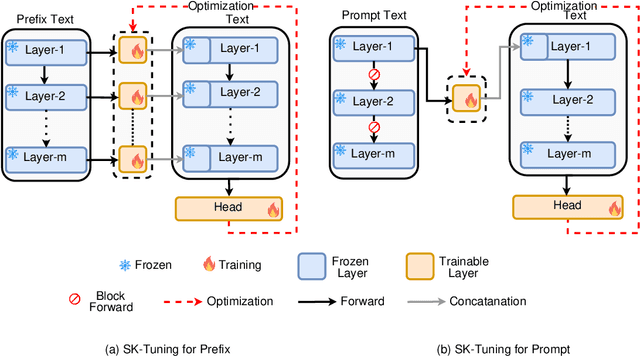
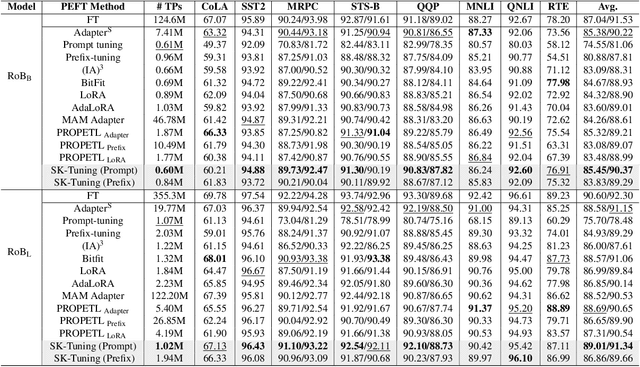
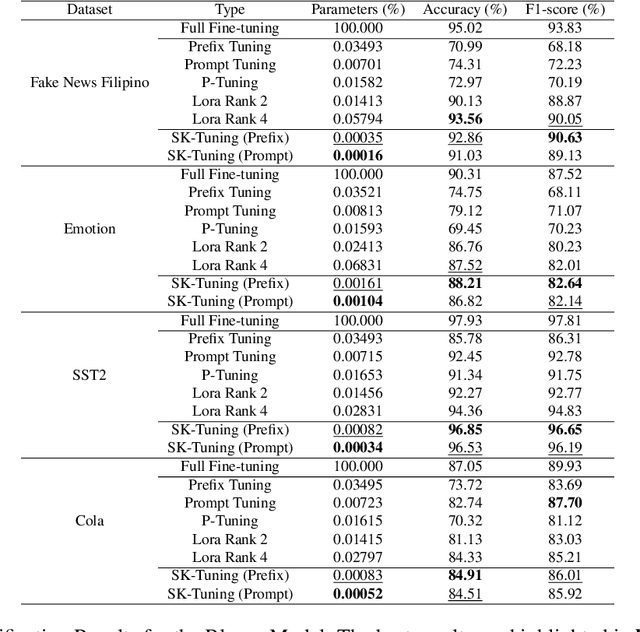
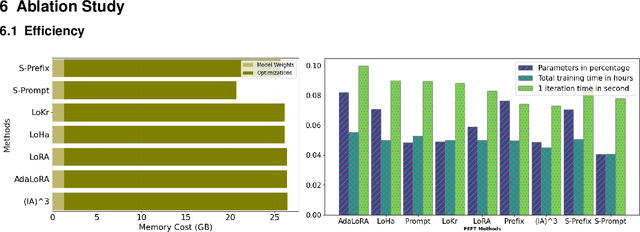
Abstract:Large Language Models (LLMs) are gaining significant popularity in recent years for specialized tasks using prompts due to their low computational cost. Standard methods like prefix tuning utilize special, modifiable tokens that lack semantic meaning and require extensive training for best performance, often falling short. In this context, we propose a novel method called Semantic Knowledge Tuning (SK-Tuning) for prompt and prefix tuning that employs meaningful words instead of random tokens. This method involves using a fixed LLM to understand and process the semantic content of the prompt through zero-shot capabilities. Following this, it integrates the processed prompt with the input text to improve the model's performance on particular tasks. Our experimental results show that SK-Tuning exhibits faster training times, fewer parameters, and superior performance on tasks such as text classification and understanding compared to other tuning methods. This approach offers a promising method for optimizing the efficiency and effectiveness of LLMs in processing language tasks.
Propulsion: Steering LLM with Tiny Fine-Tuning
Sep 18, 2024Abstract:The rapid advancements in Large Language Models (LLMs) have revolutionized natural language processing (NLP) and related fields. However, fine-tuning these models for specific tasks remains computationally expensive and risks degrading pre-learned features. To address these challenges, we propose Propulsion, a novel parameter efficient fine-tuning (PEFT) method designed to optimize task-specific performance while drastically reducing computational overhead. Inspired by the concept of controlled adjustments in physical motion, Propulsion selectively re-scales specific dimensions of a pre-trained model, guiding output predictions toward task objectives without modifying the model's parameters. By introducing lightweight, trainable Propulsion parameters at the pre-trained layer, we minimize the number of parameters updated during fine-tuning, preventing overfitting or overwriting of existing knowledge. Our theoretical analysis, supported by Neural Tangent Kernel (NTK) theory, shows that Propulsion approximates the performance of full fine-tuning with far fewer trainable parameters. Empirically, Propulsion reduces the parameter count from 355.3 million to just 0.086 million, achieving over a 10x reduction compared to standard approaches like LoRA while maintaining competitive performance across benchmarks.
Token Trails: Navigating Contextual Depths in Conversational AI with ChatLLM
Apr 03, 2024Abstract:Conversational modeling using Large Language Models (LLMs) requires a nuanced understanding of context to generate coherent and contextually relevant responses. In this paper, we present Token Trails, a novel approach that leverages token-type embeddings to navigate the intricate contextual nuances within conversations. Our framework utilizes token-type embeddings to distinguish between user utterances and bot responses, facilitating the generation of context-aware replies. Through comprehensive experimentation and evaluation, we demonstrate the effectiveness of Token Trails in improving conversational understanding and response generation, achieving state-of-the-art performance. Our results highlight the significance of contextual modeling in conversational AI and underscore the promising potential of Token Trails to advance the field, paving the way for more sophisticated and contextually aware chatbot interactions.
 Add to Chrome
Add to Chrome Add to Firefox
Add to Firefox Add to Edge
Add to Edge